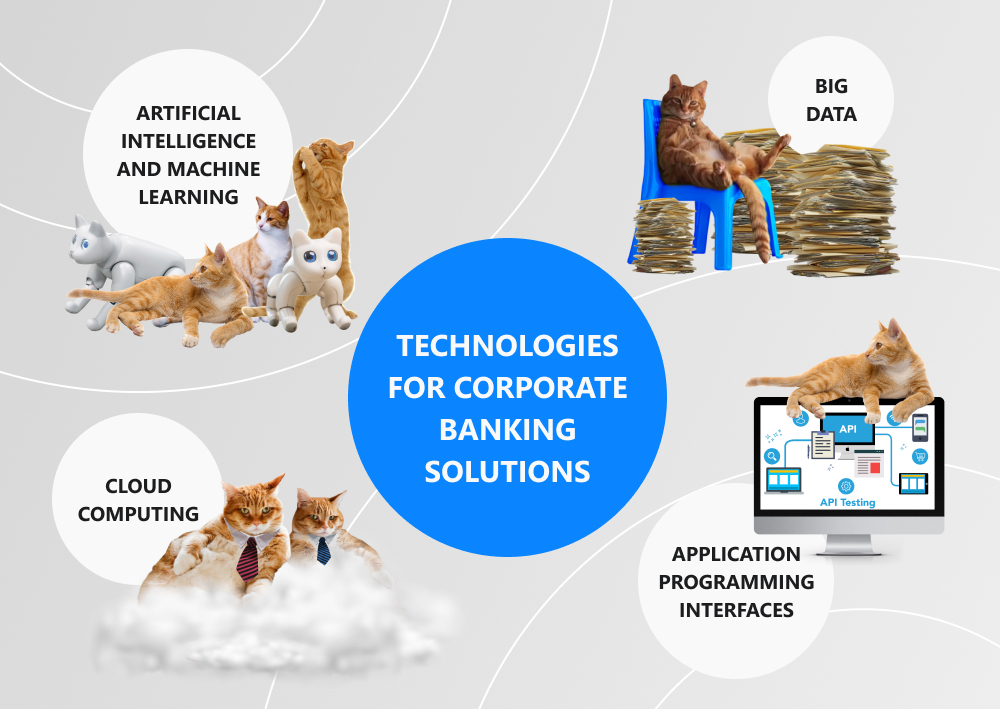Banks are now actively investing in corporate banking solutions that help them cope with challenges and discover new opportunities. Digital transformation is a way to expand their customer base and improve the user experience through the use of modern technologies. They enhance commercial banking software, allowing financial institutions to cooperate with corporate customers more closely and clearly understand their preferences, automate business processes, and reduce operating costs.
Recent research conducted by Finextra demonstrated that banks should implement digital business banking products to stay competitive in the market. What are they and what benefits do they offer to the corporate banking sector?
written by:
Alexander Arabey
Director of Business Development, Qulix Systems
Banks are now actively investing in corporate banking solutions that help them cope with challenges and discover new opportunities. Digital transformation is a way to expand their customer base and improve the user experience through the use of modern technologies. They enhance commercial banking software, allowing financial institutions to cooperate with corporate customers more closely and clearly understand their preferences, automate business processes, and reduce operating costs. Recent research conducted by Finextra demonstrated that banks should implement digital business banking products to stay competitive in the market. What are they and what benefits do they offer to the corporate banking sector?
Contents
Corporate Banking Solutions: Examples and Benefits
Corporate banking serves a variety of companies, including small and medium-sized businesses with millions in revenue and large corporations with billions of sales and offices located in different countries. Banks offer corporate customers a great number of products and services like lending, cash management and cash payments, treasury and liquidity management, investment banking, advisory services, and much more.
Today, the corporate banking sector has to address numerous challenges like the necessity to reduce costs and optimize capital, find sustainable financing and investment, as well as an ever-changing regulatory framework. Flexible and comprehensive corporate banking systems can help banks successfully overcome these issues.
For example, corporate customers come to the banks to carry out the required banking operations. Some financial institutions and businesses still conduct these operations manually, ignoring digital software. It results in numerous errors and high operational risks. Up-to-date commercial banking applications will allow them to process payments on a real-time basis. This will speed up mutual settlements and allow you to better track and control cash flows.
With commercial banking applications, customers will be able to manage their accounts, working capital, and liquidity anytime from anywhere in the world. Special platforms and services, in turn, will help banks to reorganize and accelerate the process of issuing corporate loans, as well as ensure their transparency. Business banking software can include digital banking, mobile apps, and other solutions to manage funds and transactions, interact with customers, comply with laws and regulations, and so on.
A Path to Corporate Banking Digitalization: Trends and Technologies
An Accenture study found that bank profitability directly depends on digital maturity. Let's take a look at trend technologies that can help banks improve customer experience, increase efficiency, lower operating costs, mitigate risks, and generate more profit.
Artificial Intelligence and Machine Learning
AI and ML-based solutions will help banks quickly analyze and verify potential clients that want to open an account or take out a loan. The system will collect all data about the company, its branches, customers, debts, income, etc. In addition, the platform will be able to check the documents for validity and rank the business in terms of profitability, reliability, and risk. Based on this information, the bank will make a decision.
Also, machine learning algorithms and artificial intelligence are useful when processing a huge amount of paper documentation, making reports and extracts, transferring data from one system to another, and so on. Reducing the time your employees spend on routine operations will allow them to spend more time communicating with customers.
Machine learning has long been successfully used to effectively detect and prevent fraud in the banking industry, allowing banks to quickly restrict access to a bank account, minimize losses, ensure security, and protect the assets of their clients. Besides, AI and ML platforms will help banks model risks and make better decisions on investment and lending.
AI and ML solutions are opening up new opportunities for banks in terms of robo-advisory. These are chatbots that can manage portfolios, select investment assets, collect and analyze various data, answer customer questions, and select the most suitable products and services for them. Chatbots save millions of hours and money, acting as human managers and advisors. They don't get sick, don't go on vacation, for lunch, and don't make mistakes caused by the human factor.
Cloud Computing
According to The Cloud Imperative For The Banking Industry published by Accenture, banks are showing an increasing interest in cloud technology. New realities dictate new rules of the game. Nowadays, financial institutions have to deal with huge amounts of data, change outdated business models, and apply various technical solutions that require expanding the infrastructure to store all this information. You can't manage financial risks and control your business without having the right data.
Moving to the cloud accelerates the development and release of new products and reduces logistics and personnel costs. This helps banks to reduce the cost of serving corporate customers, offering them lower commissions, more attractive products and services, as well as beneficial offers. Using cloud solutions will help you spend less time and money developing your own corporate banking software.
Application Programming Interfaces (APIs)
An API is a list and description of commands, requests, and responses that are sent by software applications to each other in order to receive any information or perform some action.
The banking API, in turn, allows an external application to access software systems within the bank itself. They are responsible for providing any banking services, such as conducting transactions, maintaining accounts, and so on. For example, the API is used when running a mobile banking app. When a client performs some action (checks the balance or makes a payment), the app creates and sends a corresponding request using the API.
Most banks' APIs are closed, i.e. only the bank and some authorized partners have access to it. Banks don't hasten to open their APIs to protect their data. Although the Open Banking concept has spread recently, according to which banks should open access to their services and data to third-party companies. It is believed that thanks to the Open API, banks will be able to implement and provide services to a wider range of customers and increase their competitiveness.
Open Banking could generate £7.2bn in revenue by 2022, according to PwC. Using the Open API, banks will be able to combine customer accounts from different banks in one application, implement personal financial advisors that will analyze customer habits and suggest optimal financial behavior strategies, personalize product offerings through transaction analysis, integrate with AI and IoT applications to create the most comfortable customer experience, and do other things.
Big Data
As mentioned above, banks have to process a huge amount of information. According to Statista, the volume of digital data reached 64.2 zettabytes in 2020 and is expected to grow to 180 zettabytes by 2025. Big Data is a technology that banks need to perform a variety of tasks, which include customer service, optimization of internal processes, risk management, combating fraud, monitoring compliance with laws and regulatory requirements, and so on.
With the help of solutions based on Big Data, banks can receive, store, and analyze a huge amount of information about their customers. This analysis will allow them to create personalized offers and calculate the risks when issuing loans and credits.
Bottom Line
So, the above-mentioned advanced technologies can be widely used to create corporate and commercial banking solutions, including cash management, liquidity management, digital banking, commercial lending, trade operations, treasury management, mobile banking apps, and so on. New technologies enable banks to implement new solutions to improve the quality of transactions, simplify operations, improve user experience, as well as build transparent and trusting relationships with customers.
Corporate banking solutions based on AI, machine learning, Big Data, the API, and banking technologies will help banks to conduct a thorough analysis of the customer base, predict the demand for services, make targeted offers for users, remain competitive, optimize internal processes, expand the geography of services, and much more.
If you want to learn more about corporate banking software development, please visit our website or get in touch with our support team.

Contacts
Feel free to get in touch with us! Use this contact form for an ASAP response.
Call us at +44 151 528 8015
E-mail us at request@qulix.com







